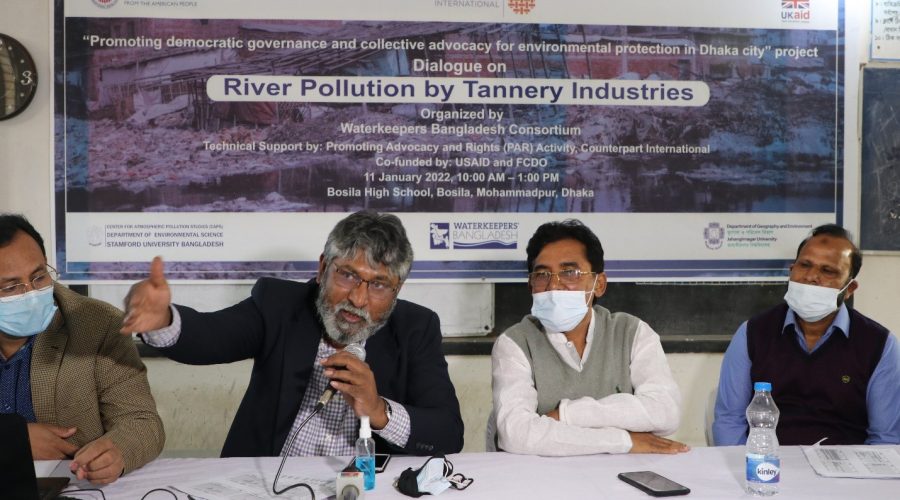
Date: 11 January, 2022
Venue: Bosila High School Auditorium, Bosila, Mohammadpur, Dhaka.
WKB consortium organized its first Dialogue with CSOs and relevant government authorities as part of its advocacy process. The topic for the first dialogue was “River Pollution by Tannery Industries”. Moderated by WKB Consortium lead, Sharif Jamil, the dialogue was attended by CSOs, government officials, tannery owners, CBOs, journalists, school teachers, and community leaders. The dialogue started with the introduction of the WKB consortium’s anti-pollution adv
ocacy project and the objectives of the dialogue. After this, a one-minute silence was held to mourn the sudden death of ASM Ali Kabir, Chairman of the National River Conservation Commission.

Dr. Md. Nurul Islam, Professor, Department of Geography and Environment, Jahangirnagar University presented research partnered with the WKB consortium on the water quality of Dhaka rivers. He said that water samples were collected from four points of Buriganga and Dhalashwari rivers. These sample collection locations are Dhaleshwari River near the new tannery industrial area of Hemayetpur, Buriganga River near the old tannery industry, Sadarghat, and Shyampur dyeing industrial points. Of the four locations, Dhaleshwari in Hemayetpur has the most polluted water quality, which currently houses the tannery industry, he added. After the presentation by Dr. Nurul Islam, there was a lively discussion participated by Eliasur Rahman Babul, Dhaka South City Corporation Ward Councilor and Senior Vice-president of Bangladesh Tanners Association; ABM Masud, leader, Bangladesh Tanners Association; Monir Hossain Chowdhury, Environment and Climate Change Specialist, National River Conservation Commission; Ms. Fatema-tuz-Zohra, Inspector of Department of Environment; Rumana Afroze Dipti from BELA; Mohammad Azaz, Chairman of River and Delta Research Centre; Fardous Ahmed Uzzal from BARCIK, Rakibul Islam from DSK; Md. Mahbul Haque from CUP; and other journalists, CSO, and CBO representatives.
